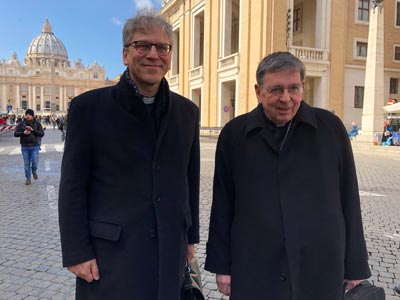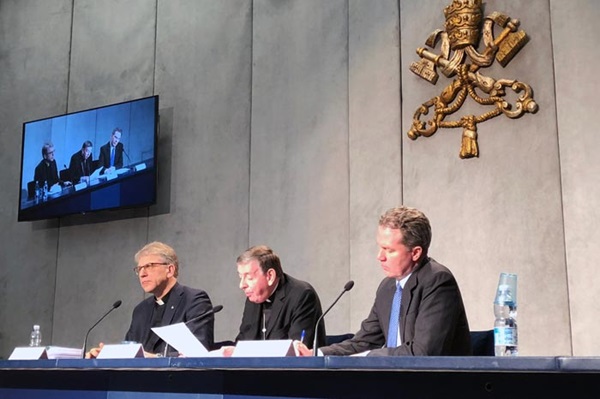The Vatican and the World Council of Churches announced the landmark visit of Pope Francis this summer.
The formal announcement took place on 2 March at a joint press conference in the Vatican with Cardinal Kurt Koch of the Roman Catholic Church, and Rev. Dr Olav Fykse Tveit, general secretary of the World Council of Churches.
As Pope Francis begins the fifth year of his papacy, the WCC is marking its 70th anniversary, and the pope's visit will cap celebrations of the ecumenical legacy and renewal of its promise.
Said WCC general secretary Rev. Dr Olav Fykse Tveit, "The news of the pope's visit to the WCC and to Geneva is a sign of hope for all who long for unity, peace and justice in a broken and divided world. It is a sign of how Christian churches can affirm our common calling and mission to serve God together."
 |
|
Rev. Dr Olav Fykse Tveit, general secretary of the World Council of Churches and Cardinal Kurt Koch, president of the Pontifical Council for Promoting Christian Unity. Photo: Marianne Ejdersten/WCC.
|
"That the pope's visit occurs on the occasion of the 70th anniversary of the WCC is a recognition of those who have prayed and worked together for many years for the unity of the Church. It is a significant sign of how far we have come in those years, through the work of the WCC and in cooperation with the Roman Catholic Church, and now under leadership of Pope Francis."
The visit highlights the shared vision of Francis and the WCC for practical ecumenical engagement, as the WCC continues to engage churches and others everywhere in concrete action through its Pilgrimage of Justice and Peace, closely paralleling and collaborating with recent activities of the Vatican.
Pope Francis has proved not only an inspirational figure but also one who is reframing notions of the church's mission, Christian discipleship, and Christian responsibility. Deeply critical of the international economic order and of environmental threats, he has championed an integral approach to the economy, the earth and the poor.
On the ecumenical front, Francis has accented solidarity in action for the poor as a way of nurturing ecumenical fellowship, along with shared witness to the joy of the gospel and the promise of social justice.
In recent years, many of the programs of the WCC and the Vatican have aligned directly, and the two bodies have collaborated closely on such issues of climate change, peace-making in war-torn countries, migration and refugees, interreligious cooperation, and of course ecumenical relations and deepening convergent theological understandings of church, mission, and diakonia or service.
Noting the strong synergy and shared vision across a range of activities, Tveit said: "The growing relations between the Roman Catholic Church and the fellowship of churches of the WCC are a real sign of hope—and not just for churches. Hope is critical for people suffering in so many places from the consequences of injustice, violence and war…. Let us pray that the visit of Pope Francis to the WCC will be such a sign of hope and common station in our shared Pilgrimage of Justice and Peace, walking, praying and working together."
World Council of Churches website
One of seven apportioned giving opportunities of The United Methodist Church, the Interdenominational Cooperation Fund enables United Methodists to share a presence and a voice in the activities of several national and worldwide ecumenical organizations. Please encourage your leaders and congregations to support the Interdenominational Cooperation Fund apportionment at 100 percent.





